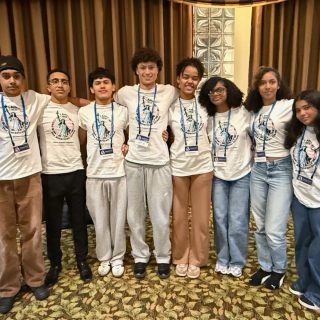Teachers’ union defends staff right to take days off for religious observances, says superintendent’s policy is not in line with ‘past practice’

ARPS teachers sought help from the teachers’ union this fall when they returned to work to a September 4 memo from the superintendent entitled “Welcome Back,” dictating that they could only take one paid day per year to observe religious holidays, and any additional days of religious observance would require supervisor approval and would be unpaid.
The district followed up in a September 14 memo sent out to staff, during which Superintendent Xiomara Herman stated that this had been the district’s policy all along, but added that now additional days beyond the one day could be requested using personal or vacation days. “In prior years, the district provided all employees one paid Special Leave–Religious Observance Day per fiscal year as identified in AESOP [the system for logging absences],” she wrote, adding that the district remains “steadfast in our commitment to honoring and respecting the religious and cultural practices of all staff.”
However, staff members said that they had regularly entered up to three or more religious days in previous years, which had been approved in AESOP. According to the APEA (staff and teachers’ union) President, ARHS English teacher Chris Herland, both the first and the second memo caught teachers off guard. “There haven’t been any issues with how [staff members] have taken off for religious holidays in the past,” said Herland.
On Thursday, September 25, Herland told The Graphic that the union had submitted a proposal asking the district to increase the number of paid days to three, noting that after that, the union supported the idea of requesting any additional days beyond three using personal or vacation time. “We proposed to keep up with past practice,” said Herland, which would grant teachers and other staff the ability to take off the majority of their religious holidays without penalty or unpaid absence.
In prior years, “some of the Jewish holidays staff have taken off have conveniently fallen on weekends, but this year that just wasn’t the case,” Herland said, “I wish they had run [this policy] by the union first.”
Herland doesn’t personally take time off religious holidays, but he reflected on the impact on coworkers that he knows do. He said it sends an unfair message to staff that “Believers in Christ have major breaks or at least days off for their religious holidays,” while others have to use personal time.
“Many Christian holidays are recognized federally on our calendar,” Herland continued. “Everyone has off for Christmas because we are a country founded by Christians.” In that way, this issue shows “implicit bias within the calendar,” he added. “Christian teachers just haven’t had to worry about this at all.”
Marita Banda, an English and special education teacher at ARHS is part of the Baháʼí faith, which is “one of the major world religions,” she said. “We have numerous holidays throughout the year that we observe.” Banda usually takes off work for three of them annually.
Banda echoed Herland’s concerns. “Unlike Christian holidays, my religious holidays are not built into the calendar,” she said. “And there are a number of people who chose to work here because they were able to practice their faith without consequences.”
Banda said the granting of three paid religious observance days per year happened for her in the past.
Math teacher Geoff Friedman is Jewish and a member of a Reform synagogue in Northampton called Beit Ahavah. He said he enjoys the community, which he said is welcoming to everyone, including “interfaith couples/families, LGBTQ+ members, young and old.” Friedman has had a leadership role for a handful of years in the synagogue, especially around the High Holy Days.
“I’ve always taken Rosh Hashanah (the Jewish New Year) and Yom Kippur (Day of Atonement) off when they’ve landed on a school day,” he said.
This year, both did, but he thinks it has often been that only one of them coincided with school. “I think I’ll probably just continue to take those days off each year until I retire,” Friendman said.
While Friedman said he was “not that fussed about” the superintendent’s memo, he said he was “surprised to [learn] the district would only honor one religious holiday absence in keeping with [what they said was] past practice,” said Friedman. He said he didn’t think that was correct, or in line with what he had always been granted in previous years. To him, working in a district that “historically honored my faith (and other faiths) by providing the opportunity to take days off without pay penalty” was one of the reasons he considered this “district a great place to work.”
A big issue in the negotiations around this policy is the difference in interpretations of what has been a longstanding policy. “Our interpretation of past practice was different than their interpretation of past practice,” said Herland, after the proposal was denied.
“In the past, I have not had a problem taking days off for Baháʼí Holy days,” said Banda. “I think it’s unfair to put a [restrictive] number on it since we don’t know all of the holy days for all religions,” she said.
Additionally, English teacher Danielle Seltzer said she thinks the impact of allowing teachers to take the days they need for religious observance is minimal. “The last time (before this year) all three Jewish new year holidays were during school days was in 2021. In that year, I took all three days off under the ‘religious observance’ category: all were approved and paid,” she said. “The next time this is scheduled to happen is in 2029.”
She added that “this also seems to be true for my Baháʼí and Muslim colleagues; it is not every year that all their holidays fall on school days.” Seltzer said she doesn’t understand “why the district is fighting so hard against what will amount to a few days over the course of a decade, which apply to only a small minority of staff.”
When the superintendent denied the union’s proposal to increase the number of allowed religious observance days to three on Tuesday, September 30, the APEA had a few options. One was to accept the one-day-allowed policy.
Alternatively, the union could file a ULP (Unfair Labor Practice) report and extend this a month, maybe two, or even three. The union requested data detailing the number of days entered by teachers in years past. Herland said the data he received back was “already interpreted for [us],” not “transparent numbers for the union to interpret themselves.”
Staff are now left “in limbo,” he said, having to decide when and how they go about practicing their religion.
“I do not think it is fair to say that we only have one paid religious holiday,” said Banda. “Our staff population is only getting more diverse, so to tell people that they have to choose which holy days are worth it to them is not in line with what the district says they stand for,” she said.
Note: On November 19, 2025, Herman sent an email to all district staff announcing an updated policy. “I would like to share several important updates regarding Religious Observance Days, which will remain in effect through June 30, 2028,” she wrote. “The District will approve up to three (3) paid religious observance days per employee each school year; additional days may be approved at the discretion of your supervisor in the Absence Management System (AESOP); and Unit A and Unit B members must provide a minimum of five (5) days advance notice to their supervisor.”














